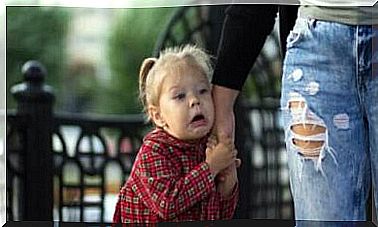5 Characteristics Of Psychopathy In Children

The main consequences arise in how the child behaves according to his environment. The child is also, in a way, difficult to handle.
Psychopathy is defined as behavioral shifts, caused by personal or psychological problems.
Basically, this means that the person suffering from psychopathy, in this case a child, has full mental and psychological skills but has not adequately adapted to his environment, due to brain defects.
Although the word “psychopath” sounds shocking, and is linked to adults, these traits can also occur in infants. In fact, most adults with psychopathy have shown symptoms since childhood.
However, it is necessary to note that a psychopath is not always insane, violent and criminal, as is often seen in movies.
It can simply be a person with a lack of empathy or sensitivity, as we will describe below.
5 characteristics of psychopathy in children
How can you recognize a child with psychopathic traits? Children who suffer from one of the forms of psychopathy usually show one or more of these behavioral problems:
- They are self-centered, unable to share, and very demanding and inflexible with their parents.
- They tend not to obey. If they show attention, it is usually under threats and they will also try to get away with it.
- They almost do not express emotions. In children, emotions are very obvious. If a child almost never externalizes his response to his environment, it may be a sign of psychopathy.
- They feel very little empathy. They have difficulty identifying and interpreting the emotions of others. Furthermore, it will also be difficult for them to get involved in an emotional relationship with another person.
- They are not sensitive. They do not feel guilt or remorse. Nor do they apologize for their bad behavior, which is often used to be dominant, either in the form of physical or verbal aggression.
On the other hand, in adolescents, the tendency to be rebellious and break the rules is often indicators of psychopathy.
There may also be ingestion of harmful substances, such as alcohol, tobacco or drugs.
However, this behavior and these actions can also occur without anything to do with psychopathic traits.

Diagnosis of psychopathy in children
As we have previously pointed out, some of these behaviors can occur as characteristics of the child’s personality. However, psychopathic traits will be characterized continuously over time.
It typically occurs around the age of 5 when the child begins to expand his social circle.
In a child who is not psychopathic, these bad manners and attitudes will disappear once they have learned the norms and values that prevail in social life.
Punishment, according to specialists, is not the ideal way to achieve this.
In children with psychopathy, however, this does not happen. The main reason is that they do not feel guilty about what they do.
Their inner aggressiveness makes it impossible for them to feel another person’s pain, or to have compassion for them – even for their closest friends or family.
Remember: violent behavior does not have to be physical. Psychological and verbal violence and abuse also exist.
Modern technological advantages allow us to measure the brain’s response to certain stimuli, and can therefore help us identify psychopathic features through positron emission tomography.
What is the cause of psychopathy in children?
As with all other mental disorders, psychopathy does not have a unique and special cause. Instead, we should talk about a combination of factors.
There are mainly three types of causes for these psychopathic traits:
- Genetic factors: Children whose parents or grandparents, or other close relatives, have had psychopathic traits are more likely to have them. The same thing happens with twins.
- Biological factors: brain damage or dysfunction can determine the acquisition of psychopathy. A poor connection between the amygdala (responsible for regulating emotions) and the prefrontal cotex may be another cause of this disorder.
- Psychological factors: the existence of mental vulnerability, activated by specific environmental circumstances, such as violence and abuse, can lead to psychopathic behavior.

Advice to treat it
Psychological therapy is a very complex alternative for these cases, which, according to psychologists at University College London, occur in 1 in 100 children.
This is because patients themselves are unable to have a sincere and open communication with others, especially with people they do not know, such as a therapist.
However, it may seem like planning an intense, long-term psychological treatment at an institution that has the appropriate human resources and interdisciplinary teams.
The latter is important as leaving the responsibility to one person by a person with psychopathy can be extremely draining to their mental health.









